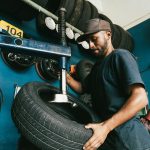Must-Have Gear for Every DIY Car Enthusiast: Tools and Accessories
Maintaining an Organized Toolbox
A well-maintained and organized toolbox is essential for any DIY car enthusiast. This, in turn, helps in saving time and enhances productivity during car repairs or upgrades.
Choosing the Right Toolbox
Selecting the right toolbox is the first step. It’s important to choose a toolbox that suits the size and type of their tools. Tool chests with various drawers can be very useful, as they offer ample storage and can be easily categorized.
For those who require mobility, rolling toolboxes are an excellent choice. They offer the same storage capacity but with the added advantage of being easily transported around the garage or workshop. Sturdy handles and smooth-rolling wheels are key features to look for.
Material is another important consideration. Toolboxes made from durable steel or heavy-duty plastic tend to last longer. Investing in a high-quality toolbox saves money in the long run. The added benefit of weather-resistant and rust-proof materials ensures tools remain protected against the elements.
Tool Storage Solutions
Having a system for storing tools within the toolbox is crucial. Drawer organizers and dividers are useful for keeping smaller tools and parts separated. Labeling each drawer or section makes it quicker to find specific tools, reducing time wasted searching.
Pegboards and magnetic strips mounted on walls can store frequently used tools. This not only frees up space in the toolbox but also keeps essential items within easy reach. Foam inserts with custom-cutouts for individual tools can prevent tools from shifting around and getting damaged.
Regularly cleaning and decluttering the toolbox ensures it stays organized. Tools should be returned to their designated spots after each use. Checking for any missing or broken tools and replacing them promptly maintains the efficiency of the toolbox.
Safety and Protective Equipment
When working on cars, it’s critical to prioritize safety with proper protective gear. Essential items include safety glasses and gloves, which protect against common hazards faced during car repairs and maintenance.
Importance of Safety Glasses
Safety glasses are essential for protecting your eyes from flying debris, chemicals, and other hazards in a workshop. When grinding, cutting, or using power tools, tiny fragments can be ejected at high speeds and cause significant eye injuries. It’s important to choose safety glasses that meet ANSI Z87.1 standards, as they offer adequate protection against impact and chemical splashes.
Clear lenses provide better visibility in low-light or indoor conditions, while tinted lenses are more suitable for outdoor work. Additionally, anti-fog and scratch-resistant coatings enhance the usability and longevity of the glasses. Properly fitted glasses ensure comfort and do not obstruct your vision, making them an indispensable part of any DIY car enthusiast’s toolkit.
Using Gloves and Protective Clothing
Gloves protect your hands from cuts, burns, and chemical exposure. Mechanics’ gloves offer both dexterity and protection, making it easier to handle tools and small parts. Nitrile gloves, on the other hand, provide chemical resistance and are excellent for tasks like working with oils and solvents. It’s crucial to select gloves that fit well to maintain manual dexterity and ensure safety while working.
Protective clothing, such as coveralls or mechanic’s aprons, shields your body from dirt, grime, and hazardous substances. Flame-resistant materials are beneficial for tasks involving welding or dealing with flammable liquids. Comfortable and well-fitting clothing ensures you have full range of motion, which is essential for working efficiently and safely. Proper attire not only protects you but also makes the repair process more manageable and enjoyable.



